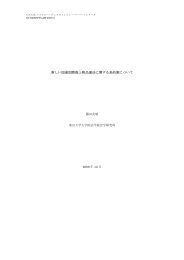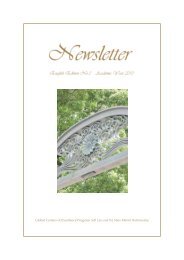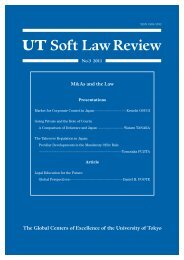UT Soft Law Review
UT Soft Law Review
UT Soft Law Review
Create successful ePaper yourself
Turn your PDF publications into a flip-book with our unique Google optimized e-Paper software.
<strong>UT</strong> <strong>Soft</strong> <strong>Law</strong> <strong>Review</strong> No.2 2010Provision of the proxy rules). And not surprisingly, most 14a-9 cases relate to mergers--theplaintiff’s claim is that inaccurate information about the transaction tainted the shareholdervote.Another potential problem with shareholder voting that has been discussed recently - I donot know how big a problem it actually is—is so called “empty voting.” “Empty voting” is theterm used for voting shares when the person or institution doing the voting does not have aneconomic interest in the firm. Through the use of derivatives and other sophisticated financialinstruments, it is now possible to separate voting rights from economic interest. And so it ispossible to have votes which are unconnected to an economic interest in the firm. Somescholars in the United States, particularly Professors Bernard Black and Henry Hu, havewritten about this. I would be interested to hear Justice Jacob’s view on how big the problemactually is and whether Delaware <strong>Law</strong> is equipped to handle this problem.Secondly, I think it is important to point out that the context for the shareholder vote isdifferent in the United States and Japan. Basically, the poison pill in United States transformsa shareholder’s decision whether or not to sell his shares in a tender offer into a votingdecision about management, because the bidder is blocked from proceeding with a tenderoffer until the pill is dealt with in some way (either removed by a new board majority orwaived in a negotiation between the bidder and the incumbent target management).Shareholders in the United States are almost never voting on the pill itself; they are voting onwhether to replace management so that the pill can be removed. In the United States, it isextremely rare to have shareholders actually voting on a defensive measure—typically thereis not sufficient time to do that, and in any event, that is simply not the structure of the poisonpill in the United States--the poison pill can be implemented unilaterally by the board. Thecontext is very different in Japan, where shareholders actually can vote on the defensivemeasure being considered by target management. I think that is an important distinctionbetween the two contexts for shareholder voting in the U.S. and Japan.Finally, we all speak of “the shareholders,” but of course, increasingly this is a verymisleading generalization. There are many different types of shareholders in all countriesnow, and they may not all have the same interests with respect to a particular vote. It isimportant to be very precise about which type of shareholder we are talking about and howthe interests of, for example, an activist institutional investor may differ from those of a publicpension fund or an individual. Certainly in the controversial contest between Steel Partnersand Bull-Dog Sauce, it is important to understand the distinctive nature of “the shareholders”when considering shareholder approval of the rights plan used in that transaction.Therefore, since both the context for the shareholder vote and the makeup of theshareholders is different in the U.S. and Japan, I think it is difficult to make generalstatements about whether the U.S. experience in this area is relevant for Japan.Fujita: Thank you very much. Every time I hear the answers to the questions about thesituation in the United States, I realize how difficult it is to simply compare the two countries.Each country has different context that lies beneath the problem, and we cannot simply say,62





